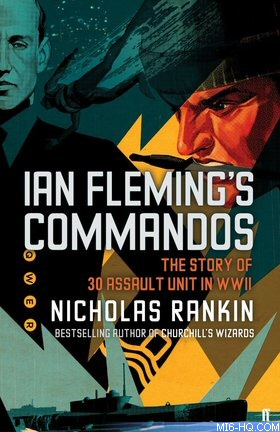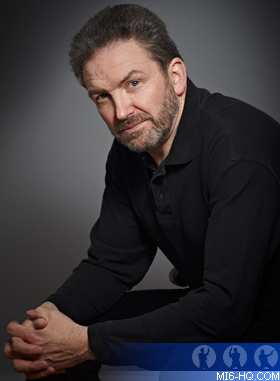 |
| |
MI6 caught up with writer Nicholas Rankin, author
of "Ian Fleming's Commandos", to find out
more about James Bond's creator and his military
background...
|
|
Nicholas Rankin Interview
13th October 2011
How did you first hear about Fleming's 30 Assault Unit and when did you know you wanted to write a full-length history?
I read the unit history, "Attain by Surprise", edited by David Nutting, which I bought six or seven years ago. But it was the Imperial War Museum exhibition, "For Your Eyes Only: Ian Fleming & James Bond" in the spring of 2008 that was the real trigger. Talking to Charles Wheeler, the late great BBC reporter who had been a Forward Interrogator with 30AU, made me think there was possibly a book there.
Were you a fan of James Bond before starting this book - had you read any of Ian Fleming's work for leisure?
As a schoolboy in the 1960s I read most of the Bond books in Pan paperbacks. They satisfied teenage yearnings for sex and adventure and worldliness. And of course the first Bond films with Sean Connery were coming out then. Everybody saw those; it was your national duty. "From Russia With Love" was the best, I thought.
Do you have a favorite James Bond story? Which rings most true with your knowledge of Ian Fleming's wartime experiences?
Octopussy, the late short story set in Jamaica, is one of the most interesting. It's about a former Royal Marine who used to be in a WW2 unit very like 30AU. His lifestyle resembles Ian Fleming's. James Bond appears as a deus ex machina or avenging angel, and as a study of alcoholic and moral decay, it's masterly.
How did you begin to research the book and what were your most fruitful lines of enquiry? Did you approach the Fleming estate at any point for advice or primary sources, what if any was their reaction to your project?
At first I kept at a distance from the Fleming estate because I wanted not to be too beholden. However, they read the final manuscript, made good suggestions and gave permission for all my quotes. Mrs Kate Grimond, Ian Fleming's niece, was most helpful in letting me read her uncle's vivid account of the 1942 Dieppe raid, the topic of my first chapter. As for sources, the Naval Intelligence Division files in the National Archives at Kew, the Beesly/McLachlan papers at Churchill College, Cambridge and the fascinating Ian Fleming material in the Lilly Library, Indiana University in Bloomington, USA were all invaluable. |
|

Above: Cover art for Rankin's book "Ian Fleming Commandos", released in the UK this week.
|
Did you have the opportunity to interview anyone that knew Fleming or participated in the ops he staged?
I talked to quite a few of the Royal Marines who served in 30AU and the book is dedicated to them. Robert Harling, in his Sunday Times obituary of Ian Fleming in 1964, described these commandos as "merry, courageous, amoral, loyal, lying toughs". "Bootnecks" have a good sense of humour, and have survived longer than their officers, none of whom are still with us.
A lot of commentators have speculated about the identity of the "real James Bond" or Fleming's inspiration for the character - do you feel one person is more worthy of the title than the various others, if so, who and why is that?
My first book was about Robert Louis Stevenson, and you would not credit the number of places identified or claimed as the "real" Treasure Island. But fiction does not work quite like that. James Bond is an amalgam of real people, but mostly an alter ego of Ian Fleming's and a fantasy projection of the action man he never was.
How long did you spend researching in comparison with the time it took you to write the book?
The late Roy Jenkins recommended "keeping the infantry close up behind the artillery" and it's good advice in relation to research and writing. I work with multiple sources and I'm continually checking and rummaging as I write. Then you edit and rewrite, so it's layering of both.

|
|
Can you describe your writing process - what is a normal day like when working on a book like "Ian Fleming's Commandos"?
Writing is bums on seats. My wife calls me Googleman because on Google Street View you can see me in my office window at home staring at the computer screen. I don't get out much while I'm writing a book. I know the copper beech across the street very well in all its seasons.
Could you identify one interesting tidbit about Fleming or his work that surprised you when researching the book?
Firstly, he was bloody good at his job throughout the war as Personal Assistant to the Director of Naval Intelligence. Admiral John Godfrey, who first hired him (and later became the basis of M in the novels), said that Ian was "a war winner" and really should have been the DNI himself. After Godfrey was sacked, Fleming really ran the show on his lines.
Left: Writer and broadcaster Nicholas Rankin. |
Secondly, Fleming's total bookishness. He was a great reader and collector of books and amassed an amazing collection of original works on social, scientific and technological inventions since the Industrial Revolution. A very curious mind.
Others have documented the history of 30 Commando before - what particular angle or information have you discovered that will set your work apart?
No earlier work has set 30AU/30 Commando in its strategic and intelligence context the way I do. One Marine survivor told me that he knew more about the unit from my book than when he was actually in it. I link Fleming's wartime career to specifics in the Bond books and because Fleming was himself a good clear writer I have tried to write this book as well as I can at a sentence level.
Thanks to Nicholas Rankin.
Related Articles
 Ian Fleming's Commandos - Book Preview
Ian Fleming's Commandos - Book Preview
 Order "Ian Fleming's Commandos" - Amazon UK
Order "Ian Fleming's Commandos" - Amazon UK